Since the 1970s, Hong Kong has enjoyed and celebrated its queer culture. Disco Disco — an after dark haven for outrageous parties — served as the city’s answer to New York’s Studio 54 and the club quickly changed Hong Kong nightlife forever. Similarly, across theatre, art, literature, fashion and film, it was the the queer community who forged the way creatively.
This appreciation for queer art and community unfortunately doesn’t extend on paper, as Hong Kong society remains entrenched in conservative values. Gay marriage isn’t recognised and, although some of the city’s biggest buildings are rainbow-washed for Pride, Hong Kong is far behind the rest of the world when it comes to LGBTQ+ rights. It’s thanks, in part, to the cultural significance of the archetypal family in Chinese traditions and Confucianism, but it’s as much a result of the Christian leanings of its former colonial government. Until 1997, the British preserved power in Hong Kong by reinforcing conservative cultural values in response to Chinese nationalism on the mainland, and the repercussions can still be felt.
Even today, it’s incredibly difficult to go against the grain with increasing Chinese control in Hong Kong. But a new generation of creatives are finding some degree of freedom through their work as designers, artists, models and DJs, using their platforms to push boundaries. They’re coming to embrace their sexuality despite, oftentimes, having a lack of support from their families. Here, some of the city’s most exciting young queer creatives share the challenges they’ve faced in Hong Kong and speak about their hopes for the future.
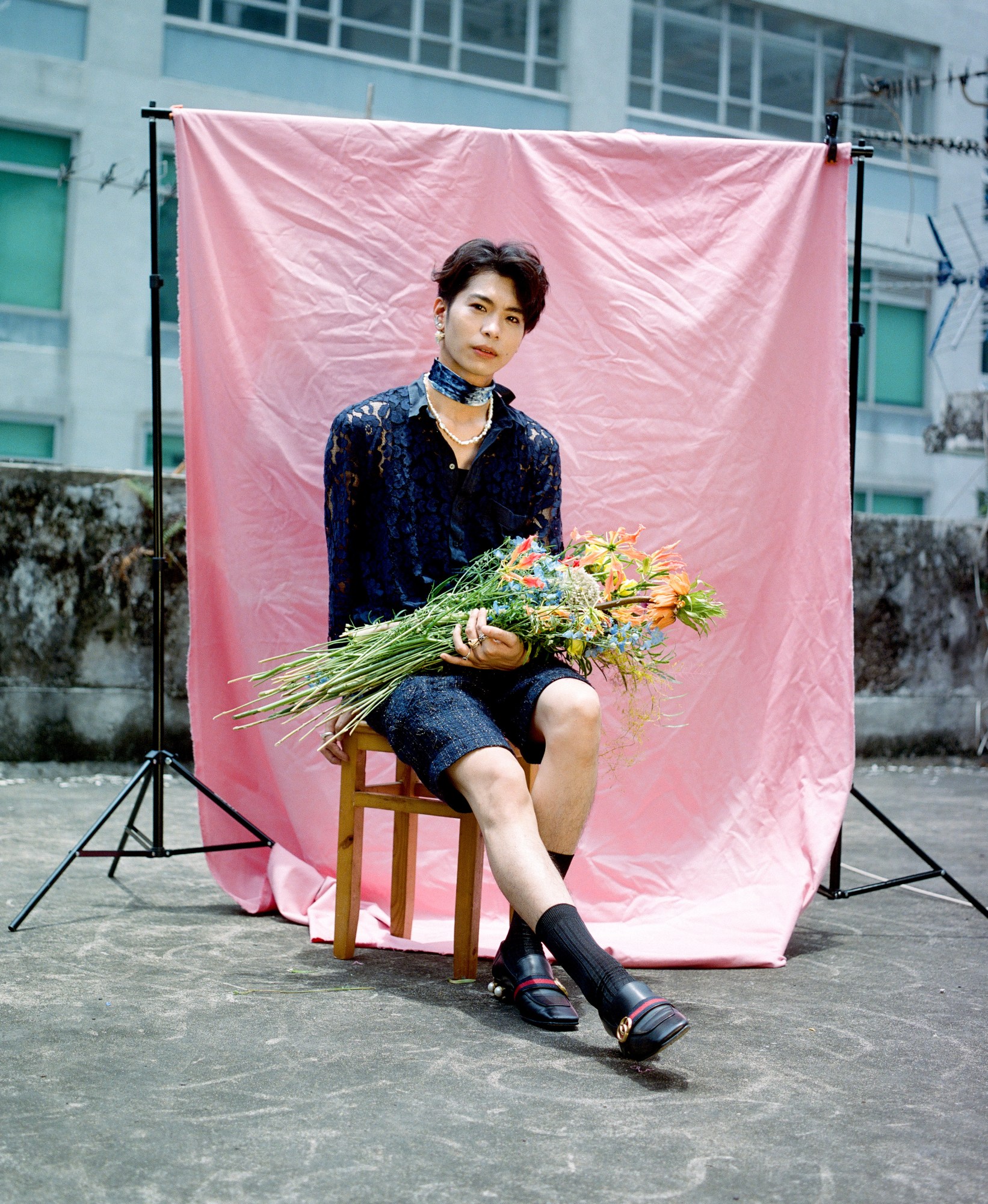
Mite, florist at Gingermite
When did you start floristry?
Four years ago with my mum. She was a graphic designer back in the 90s and helped a lot of movies to design posters. But after my brother and I were born, she became a full-time mum. When we left home she became depressed and bored. I was an editor in Harper’s Bazaar, and I remember coming back from Paris to Hong Kong and at 7 a.m. my mum was waiting for me, crying. She said she had a lot of talents and a lot of things she wanted to do. So I asked her what she would enjoy and she said, ‘I want to do something related to nature’. So we started our flower business from our home, on our dining table. Ginger is my mum’s name, and then I’m Mite, so our flower shop name is Gingermite.
How do you find the queer community in Hong Kong?
Because I was in the fashion industry, I think it’s quite liberal. But I work in the industrial area, and one day, I was walking around when a 50-something old man working on the construction site came up to me and said: ‘You cannot wear that, you’re a man. I like your outfit but it’s for women not for you.’
What was it like growing up in Hong Kong?
When I was studying in secondary school, some people would question why I liked the stuff that girls liked. But I think this happens in every country. K-pop culture helps Asian men to develop their femininity more because they will put on makeup and dress not how people usually think that men dress. It pushes the limit a lot. There are also quite a few gay icons in Hong Kong, like Anthony Wong Yiu Ming.
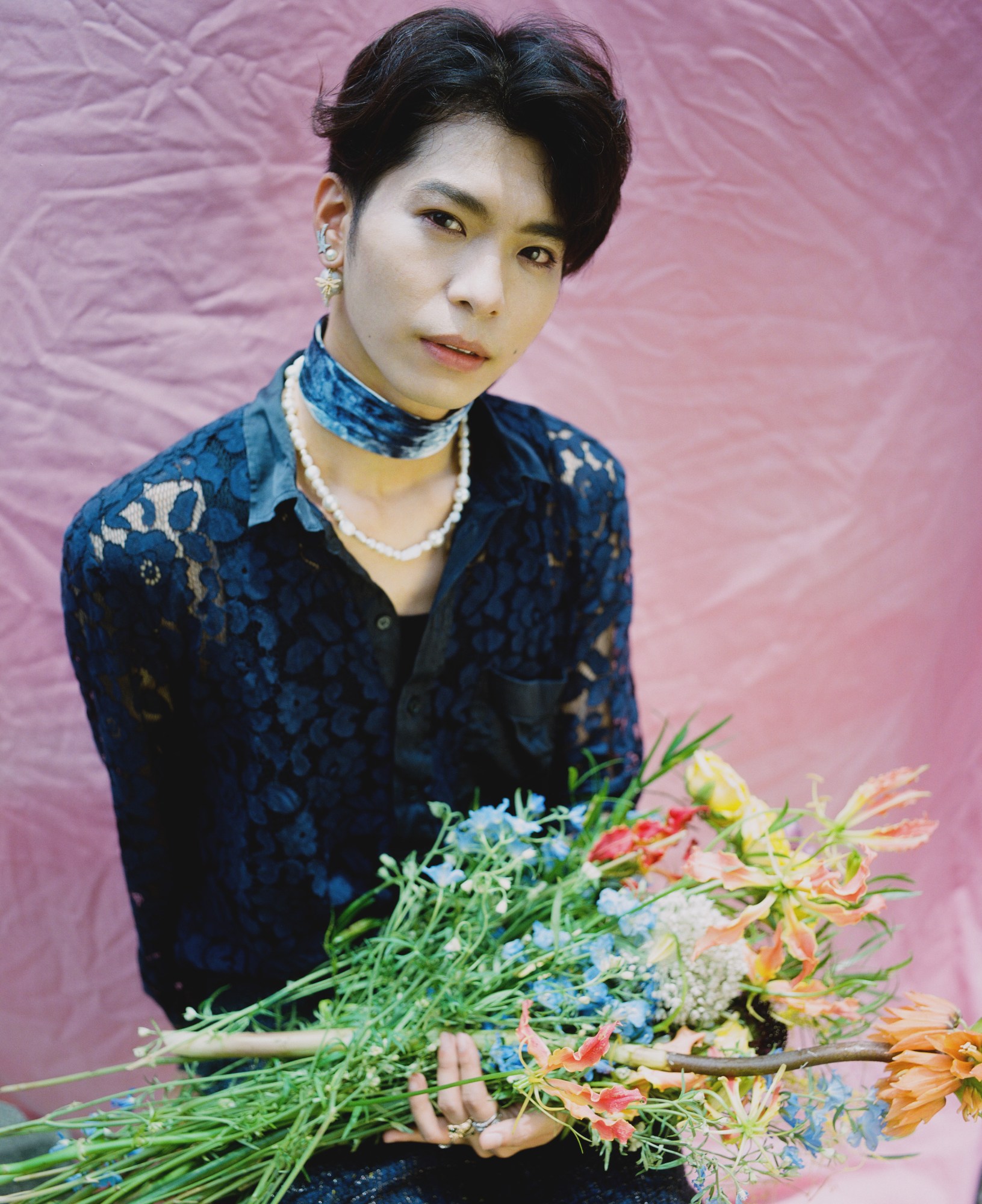
How would you describe your style?
I think I’m quite flamboyant. I’m a really brave individual because I’m not afraid to express what I feel or what I think. And I think it helps me to shape my style because I just put on everything that I want: a lace top with tweed shorts with a lot of jewellery. My grandma inspires me a lot. She passed away, but my mum told me when I was small I always looked at her hands. She had a lot of jewellery.
Do you have any words you live by?
Do you know the law of attraction? It says that what you think will be. You can create your life — everything is governed by your mind. It’s especially important in Hong Kong right now. It has quite a sad atmosphere, it’s really heavy in the air here. We need to keep a positive mind.
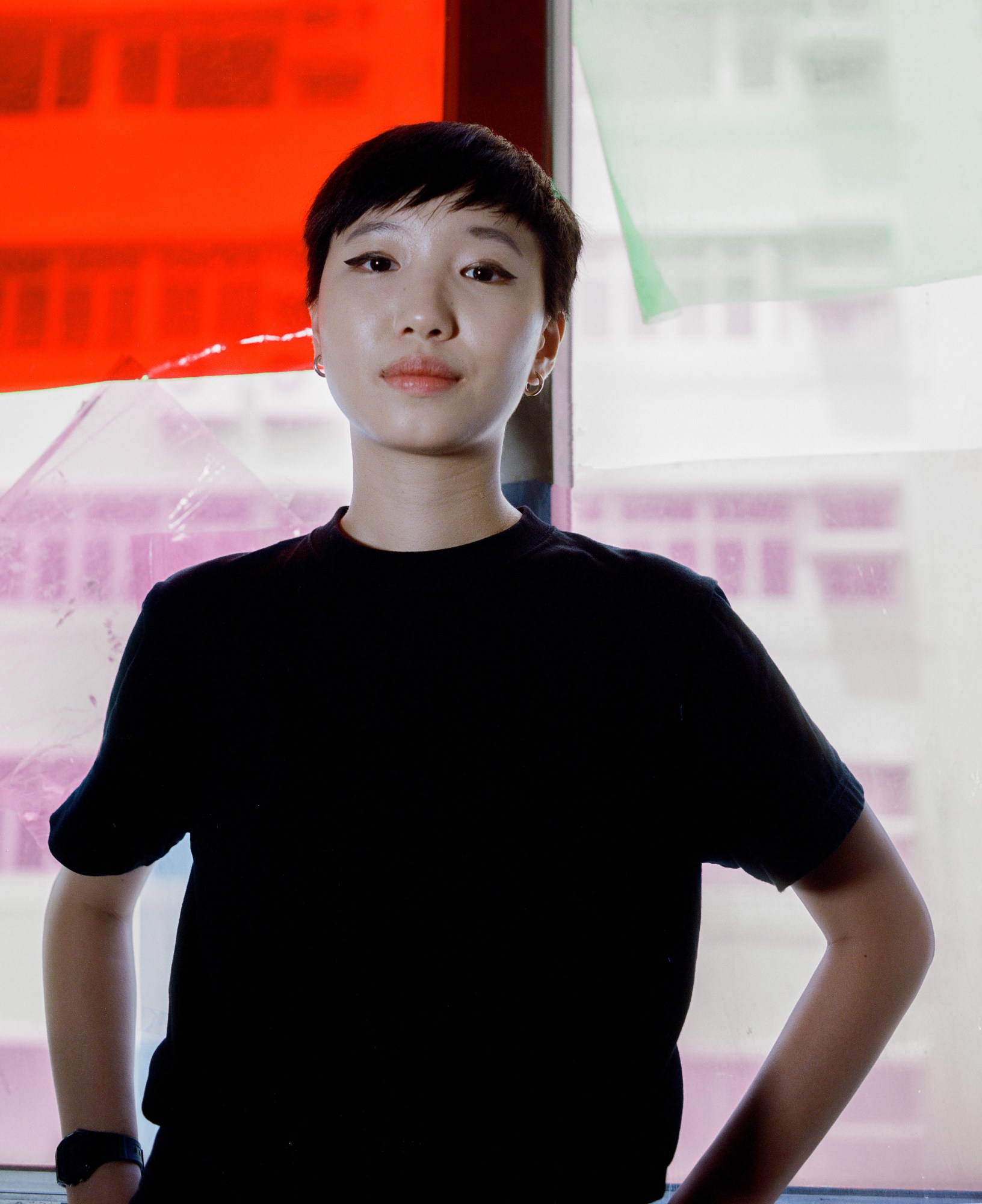
Kaitlin Chan, illustrator and co-founder of the Queer Reads Library
Tell me about your illustrations.
I make a lot of personal comics that I share on my Instagram page. I read a lot of fiction books, but I feel nervous about trying to be someone else. I feel more comfortable at this point in my life telling stories from my own community and about myself.
Is identity something you’ve had to grapple with?
I didn’t feel comfortable with myself for a very long time. I had a lot of queer friends, but I was afraid to admit that to myself for different reasons. I grew up in a very Christian environment and I went to church from a very young age. I went through all the formal rituals like baptism, confirmation, youth group, church camp. It’s a community that’s anti-homosexuality, which is actually very stressful. You internalise that for so long, combined with the sex education that you get in school that’s about men and women. It’s repeated so much that I think even straight people think it’s weird.
I had some queer friends in Hong Kong, and they were telling me I didn’t have to prove myself. I had done things in college with women, but I didn’t feel comfortable claiming it because everyone who was queer was like, ‘I’m definitely lesbian’. I met people in Hong Kong and they really welcomed me.
How would you describe the queer community in Hong Kong?
There has been a very active queer subculture ever since the 70s. When you hear stories from older queer people, you realise it’s always been there. There are just different conduits and it’s changing based on gentrification, and the way that the city is organised… I think that the way that people talk about queer history in Hong Kong is the time of disco and also saunas, which specifically cater to bisexual and gay men. They are spas where you can hang out, meet people, have sex and they have been active for many years. For lesbians and queer women in Hong Kong, the bar scene is very small. I like places that have queer-oriented programming — like Eaton Workshop — that’s all year round, not just in June.
How has your art practice helped you along your journey?
My illustrations are like my diary. I’ve been working on a book that’s a coming out journey, for a couple years now.
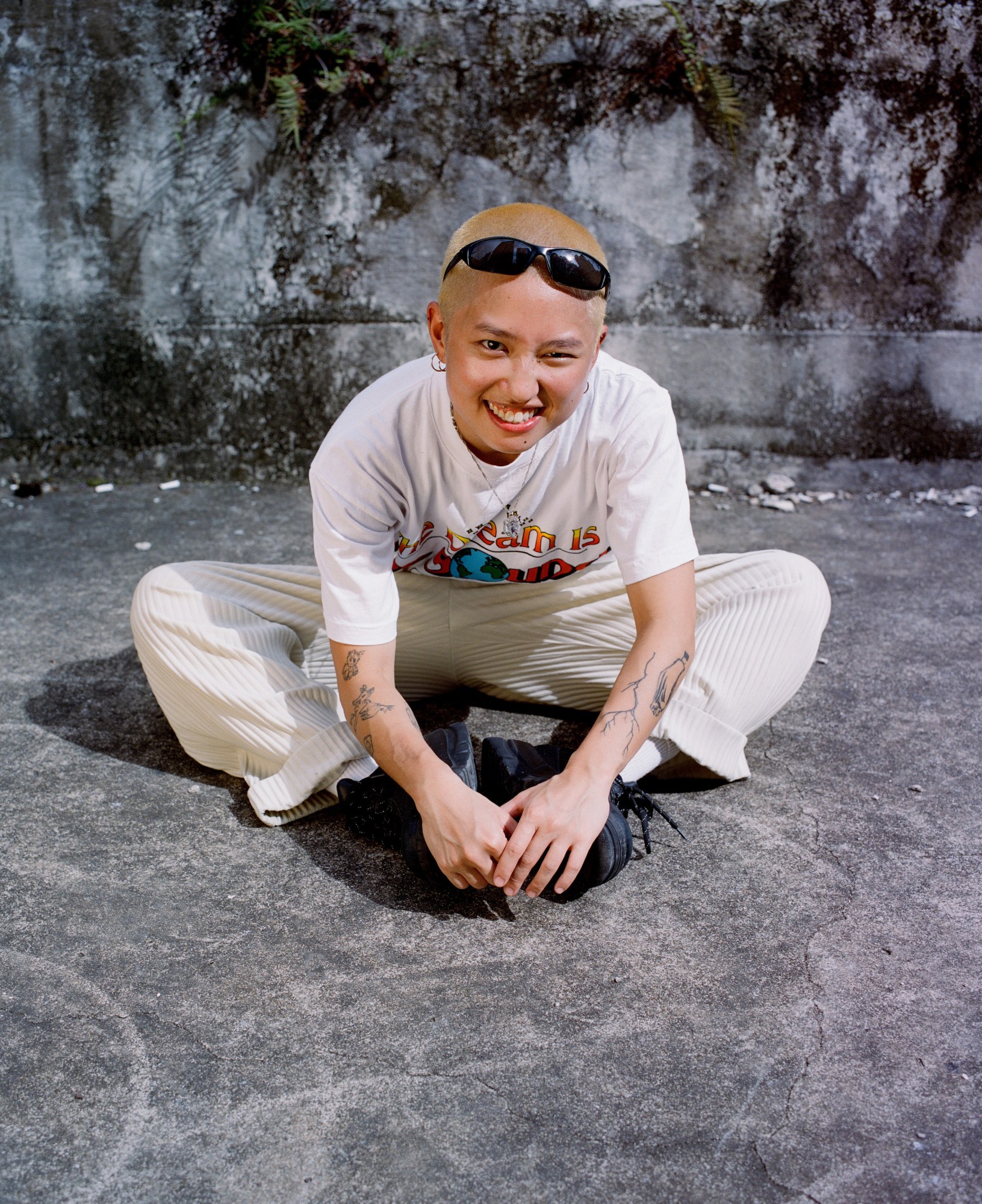
Winkie Lam, DJ and photographer
What kind of music do you play?
I like techno, some experimental music and jazz. I play at Social Room, Minh, and I am the co-owner of a creative space called 18th floor. It was in a warehouse building in Kennedy Town, but we’ve just moved to Sau Kei Wan so we’re still figuring out the name.
How did 18th floor come to be?
I met the other [founders] at a party, we all got on really well and they asked if I wanted to join the collective. Some of them are photographers, others are directors, it’s a mix of creatives. We used to host parties but now we want to focus more on art and culture, and unseen stuff in Hong Kong. Maybe have a private cinema night, playing movies that are not allowed to be played outside or pair fine dining with music.
People talk about Hong Kong being a creative desert, do you agree?
I feel like there’s a strong scene but the audience is lacking. There are lots of people doing good things but the audience has bad taste and they don’t get it. You have to do some commercial stuff to satisfy them.
What about being queer in Hong Kong?
I think it’s more open now. When I was younger I used to live in Yau Ma Tei and people used to yell at me, ‘You fucking lesbian.’ But I just laughed. I think just be yourself. My parents always ask me, ‘Do you have a boyfriend?’ I kind of came out to them, but they try to pretend and avoid the truth. Chinese parents are still quite conservative.
How do you think your generation will change Hong Kong?
I think my generation will change Hong Kong into a more free and creative city. I want the world to be full of love and support, full of people that can express their creativity freely.
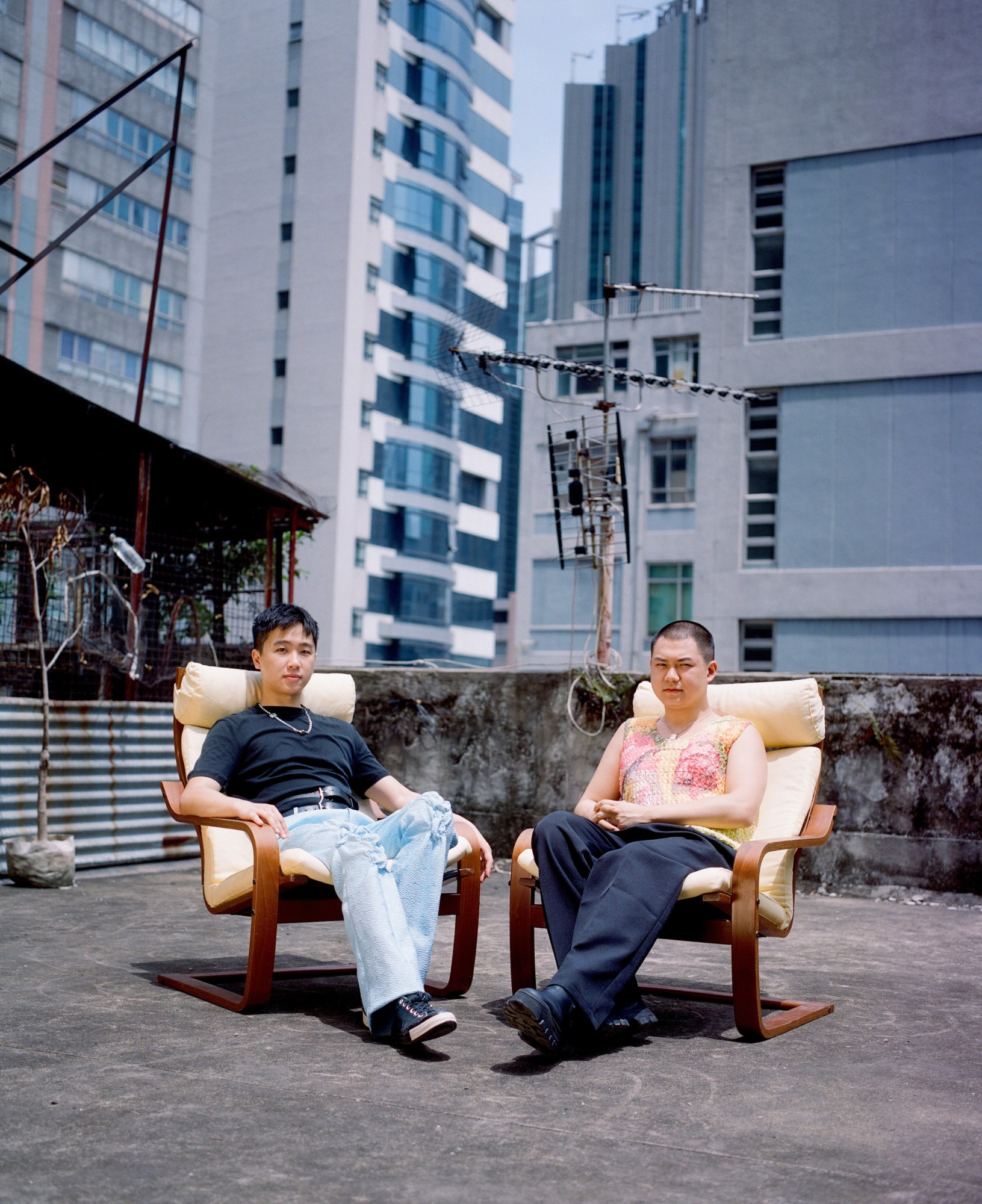
Derek Cheng and Alex Po, founders of men’s fashion label Ponder.er
Can you tell me why you started Ponder.er?
Derek: When we were at Central Saint Martins we were both doing menswear in a slightly different perspective, because I think students usually focused more on tailoring. We were in fashion design and marketing, so we had a little bit more freedom to do what we want.
Alex: Our aesthetics were quite different. I was doing a lot of printed menswear, weaving and textile work. But we also had the same take in that we don’t like traditional menswear.
Derek: The reason we wanted to start the label was to challenge that stereotypical concept of what menswear can be. I think it’s becoming more important to talk about masculinity. Obviously fashion has always been talking about women and empowering women in different forms and shapes. But within menswear, it’s a little bit less talked about.
How do you find being back in Hong Kong after spending time in London?
Derek: Going to London was actually quite liberating because you don’t see gays openly holding hands [in Hong Kong], whereas in London it’s such a common thing and people don’t see it as a problem.
Alex: I always missed Hong Kong, and I feel like some part of our aesthetic is actually combining the two places.
Derek: Our work isn’t explicitly showing Hong Kong elements — there’s no neon lights, but every season we do put very subtle inspirations that we saw on the street or things that are happening around us into the collection.
Alex: There’s a new print that inspired by these little Buddhas and street images in Wanchai.
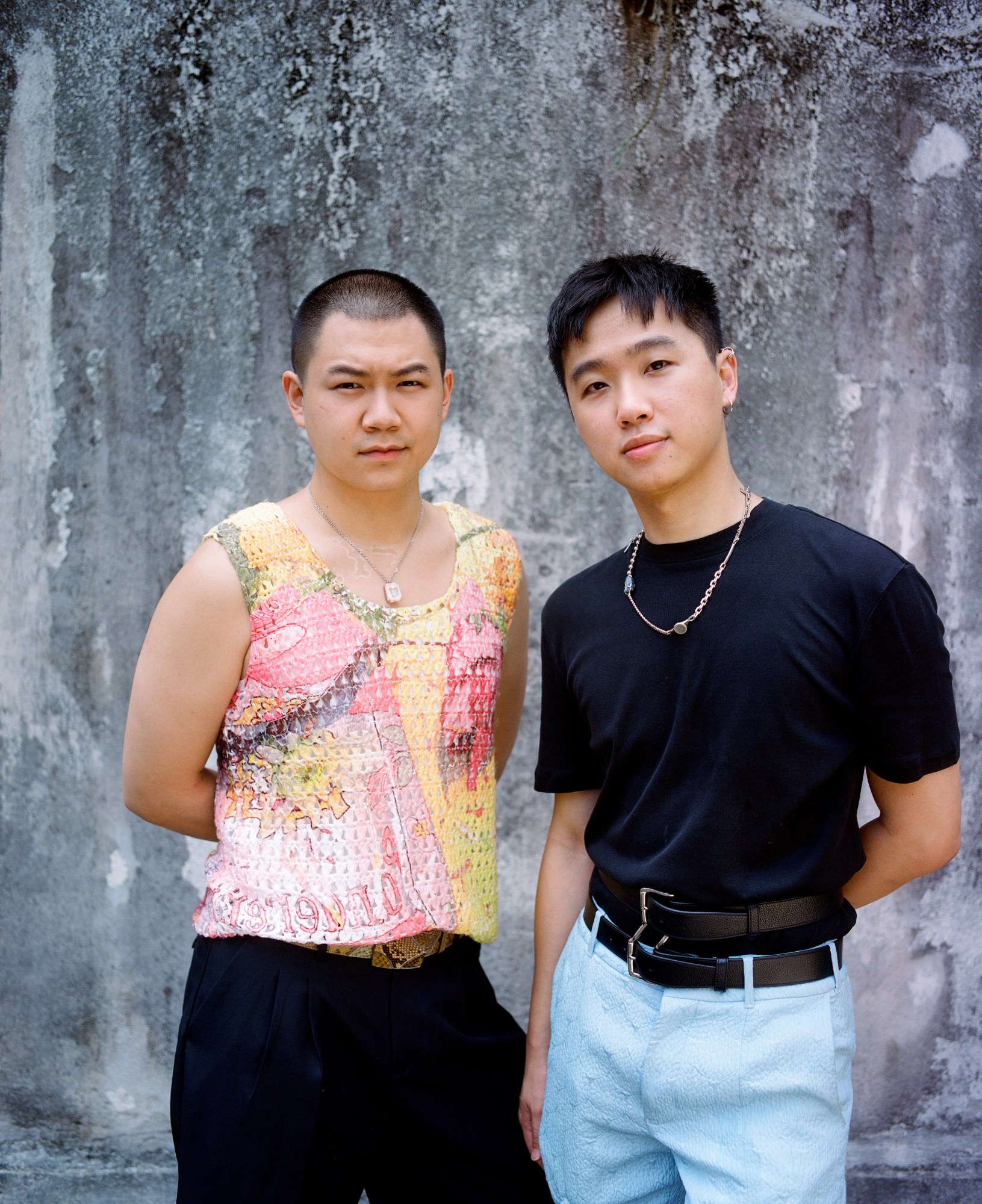
What do you think of Hong Kong’s creative scene?
Derek: Hong Kong people have such a great tendency to discredit ourselves and discredit the city as a city that has potential for creativity. I remember when we were young, Hong Kong was often called a cultural desert. But I think in recent years, the creative scene is growing.
What was it like growing up here?
Derek: I was very lucky because when I was in secondary school, I already had friends that were gay so we were able to talk about stuff. It’s weird to say this in 2021, but it’s hard growing up having this kind of secret. It’s not a taboo anymore, but people don’t really think it’s an important issue. You don’t see the legislative counsel addressing it. There was member of the legislative counsel who said something publicly against next year’s LGBTQ+ games, he said it was disgusting to display this kind of behaviour publicly. Hong Kong had the potential to be the frontrunner of gay rights in Asia, but it’s still not happening.
What’s inspiring you both, now?
Derek: Last season, we looked at old movies like 007 and Indiana Jones, and challenged their concept of masculinity.
Alex: We’ll take a denim jacket, but deconstruct it and give it a water-y shape. It’s supposed to be structural but then we use mohair to change the whole perception of the denim jacket.
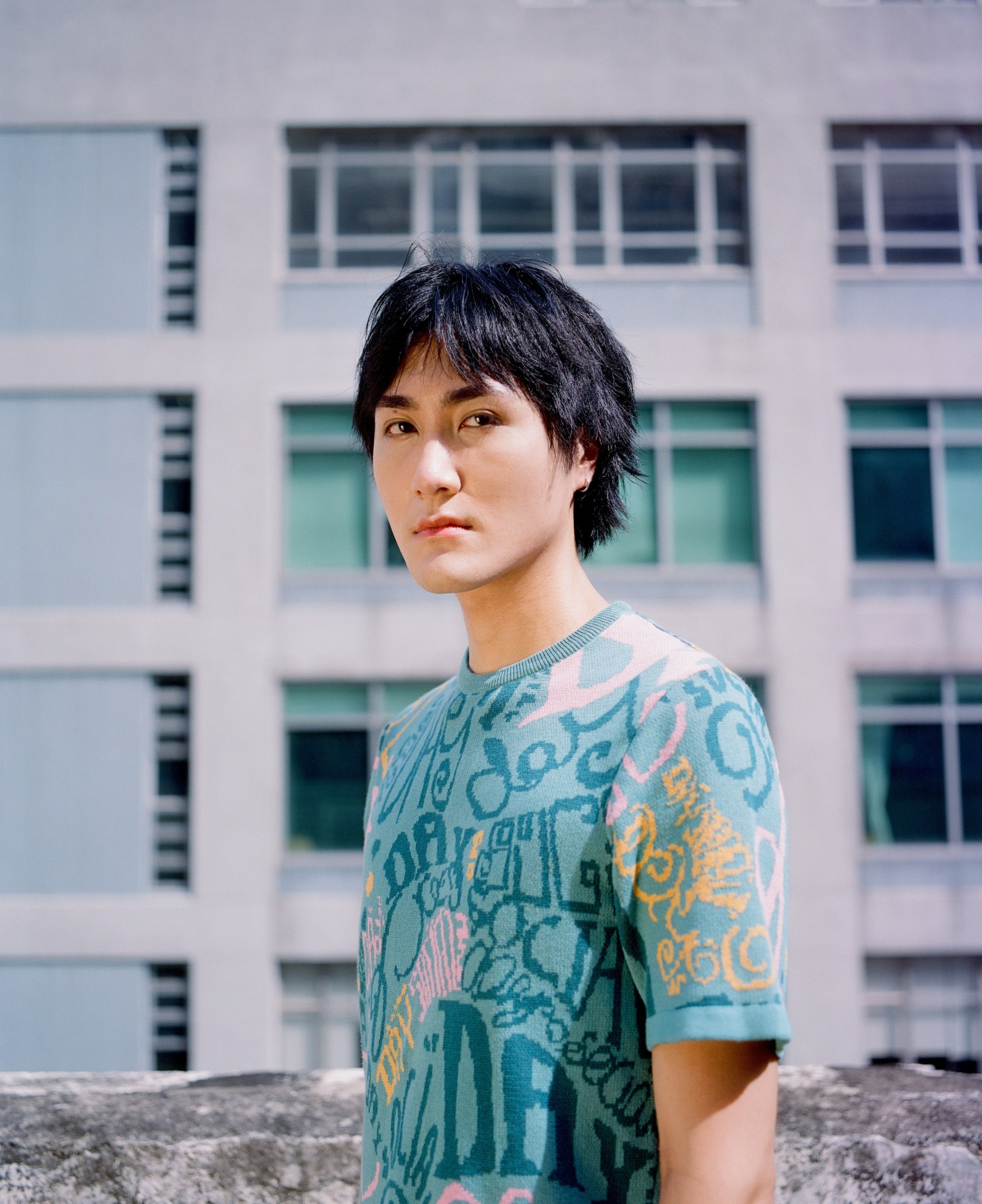
You grew up in Hong Kong, do you think it has changed much creatively?
Hong Kong’s local creative scene is very different to foreign places like Japan and Taiwan that have their own aesthetic. It’s really unique because it’s a really small city, but it’s both ghetto and boujie at the same time. It’s conflicting.
How do you find modelling in Hong Kong?
I signed a modelling contract when I was 17, and have walked in fashion week, done some advertisements and commercials. But I’m too tall to be a model in Hong Kong, really, because so many clothing brands do their re-sizings in Asia. I’m too tall for Asian people but I’m not white enough for white people.
How would you describe your personal style?
It very much depends on what mood I am in; you can always tell how I feel through my style.
What is it like to be queer in Hong Kong?
I feel like I’m really different from local gays because they are all a bit basic. People are still really uptight and they follow the mainstream gay standards.
How did your parents react when you came out?
I did it really naturally. I got a new phone and I gave my old one to my dad, and he was checking my phone. I thought I’d deleted everything but he got to my bookmarks and there’s so much gay porn on my bookmarks. But they don’t care — it’s very free in my family, which is weird to see in a very traditional Chinese family.
How do you think your generation will change Hong Kong?
My generation is changing and challenging so many boundaries and standards. I’d say we open up people’s minds to accept the differences in human beings.
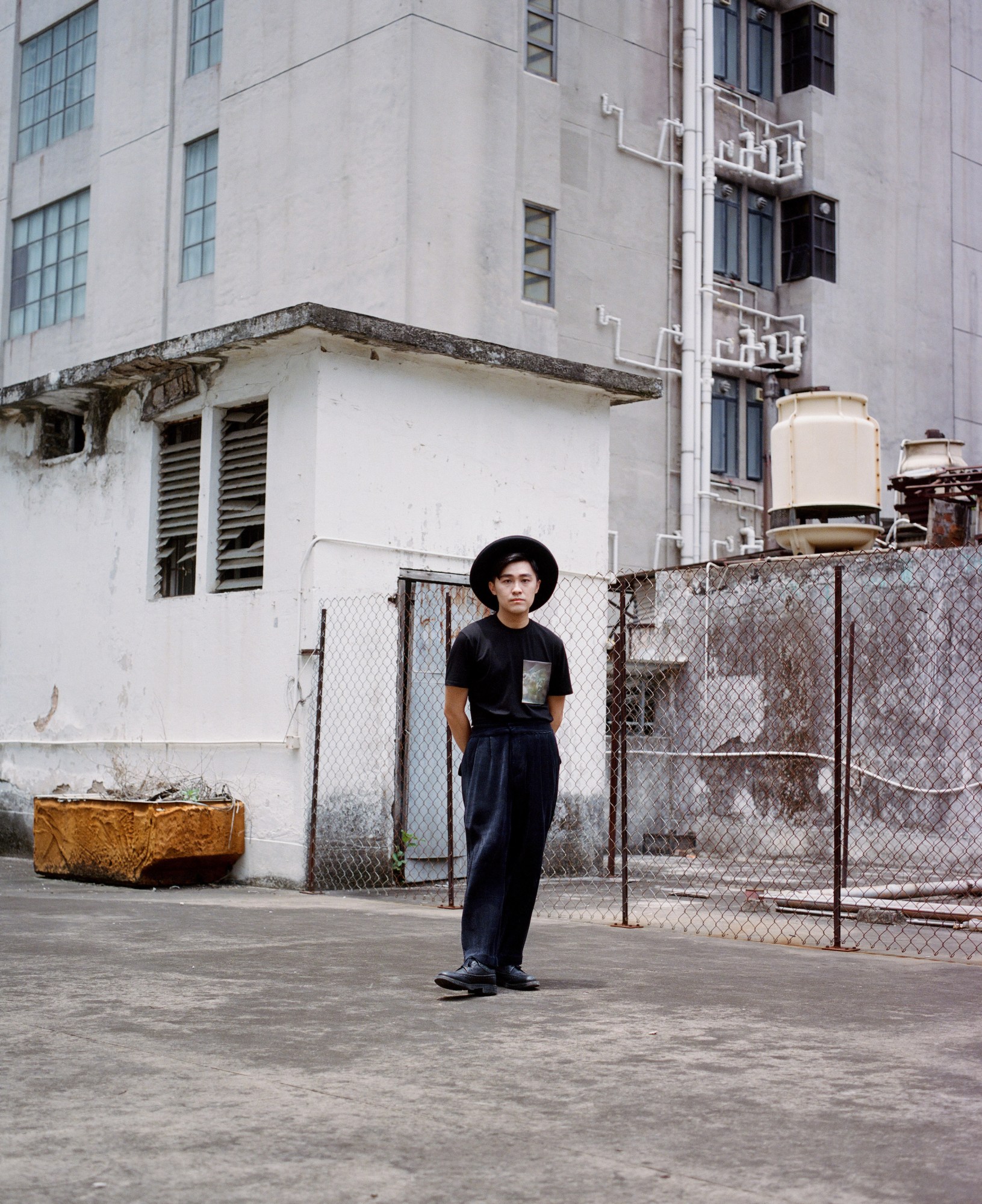
Derek Chan, founder of the menswear brand DEMO
When did you set up Demo?
I started my brand part-time in 2014, when I was studying at university as a research student. I was looking at biotextiles — using bacteria and food ingredients to grow a layer that looks like leather, and then I used this material to make clothing.
What inspires Demo’s aesthetic?
I think that society gives a lot of stereotypes to men. For example, people always say that women can cry but men or boys need to keep in their emotions. I think we need to open possibilities for men. Boys can also be soft and emotional. Demo is an androgynous brand; I think it’s very interesting to treat a person as neutral.
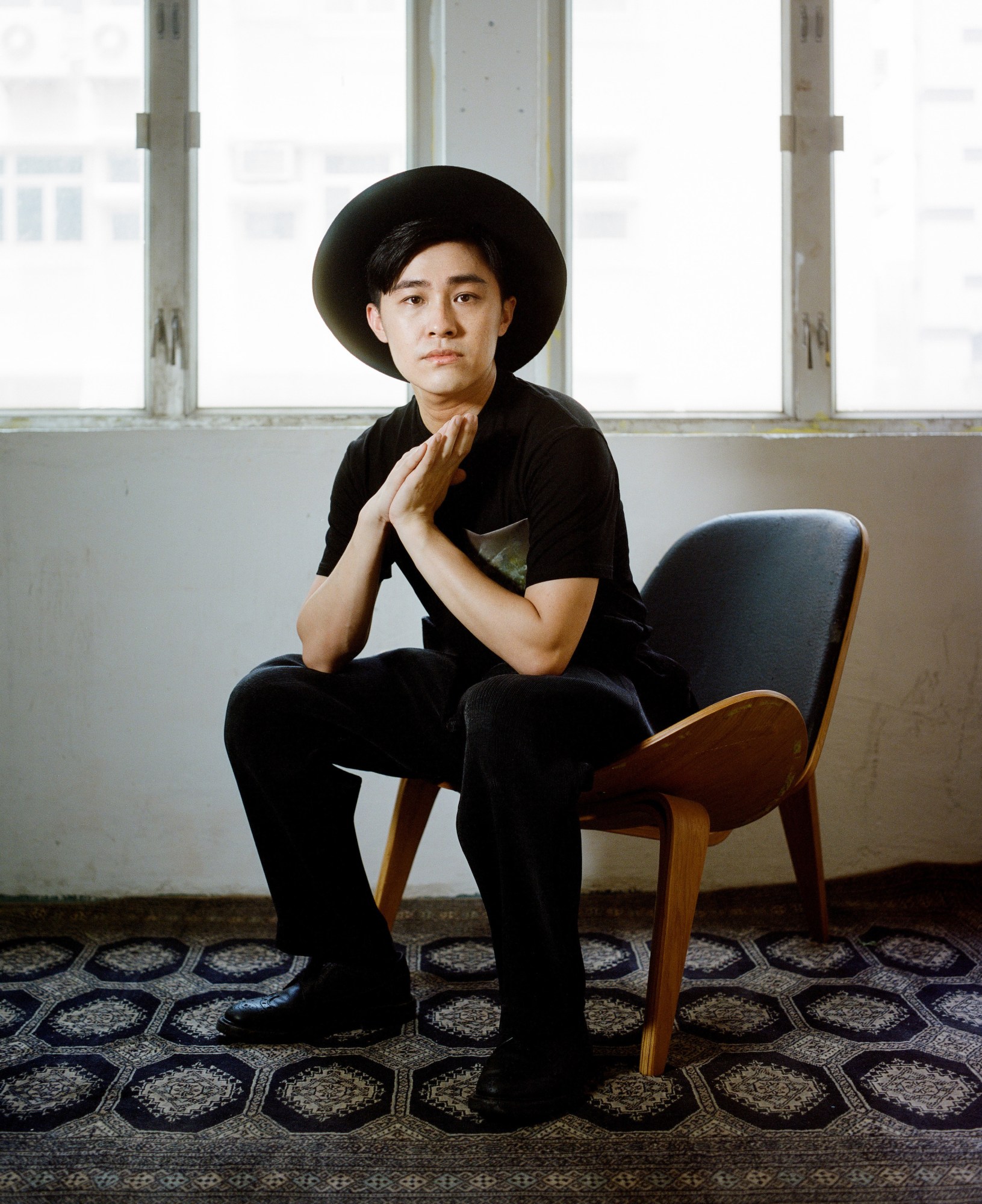
Growing up, was it hard to express your sexual identity in Hong Kong?
I just came out in 2019, a few years ago. I figured out that I liked boys when I was in secondary school when I was 15 years old, but I didn’t tell my family because it’s too young. Even now, my mum knows but she told me not to tell my dad.
What would you say to people trying to explore their own identity?
I always tell people to shine bright. Let your inner self come out. In my designs, there’s a lot of crystal embellishment. It’s fancy, so people will look at you in the crowd. Don’t be normal, we need to be powerful.




